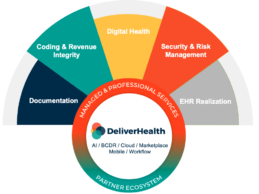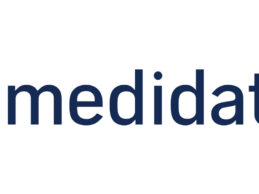What You Should Know:
- DeliverHealth, a provider of technology-enabled solutions for hospitals, health systems and group practices launches artificial intelligence (AI) driven autonomous coding for a simpler, more efficient way to accelerate revenue cycle optimization.
- The autonomous coding platform removes inherent complexities clinicians and care teams face while helping administration and operations obtain the realization of their EHR investments.
Combating the Impact of the
Read More
risk
Medidata Launches New Clinical Operations Technologies
What You Should Know:
- Today, Medidata, a Dassault Systèmes company, is announcing technology enhancements that address key issues in clinical trial management and oversight.
- These enhancements are to Medidata Detect and Rave CTMS (Clinical Trial Management System), which will improve both data oversight and reporting for sponsors and contract research organizations (CROs) in two meaningful ways: how they comprehensively monitor their trial data, and how they
Read More
TDS Acquires PrescribeWellness from Tabula Rasa HealthCare in $140M Deal
What You Should Know:
- Transaction Data Systems (TDS), the leader in pharmacy software solutions has acquired PrescribeWellness from Tabula Rasa HealthCare in a deal worth up to $140M.
- Further, TDS’s plans to accelerate product innovation will create solutions to further optimize pharmacy workflows, support real-time clinical interventions and expand patient engagement opportunities to clients.
Acquisition Benefits for TDS
TDS connects community pharmacies through its
Read More
What Hospital Success Looks Like Under Value-Based Care
Hospitals are increasingly turning to value-based care initiatives to transform care delivery, lower the total cost of care, and improve patient outcomes. Unlike traditional fee-for-service (FFS) models that reimburse providers based on volume (i.e., the number of patient visits), providers are reimbursed based on the quality of care delivered in value-based care. Ultimately, success under these reimbursement models hinges upon seamless coordination between all stakeholders across the continuum
Read More
Lessons from COVID-19 Pandemic and the Smart Facilities of Tomorrow
As much as we all wish it were otherwise, the COVID-19 pandemic continues to claim lives and upset stability around the world. If this worldwide disaster has a narrow silver lining, it is the many lessons it has to teach us moving forward. These lessons cover every aspect of life from business to relationships, but none more than healthcare. We have seen the incredible strain COVID-19 has put on our healthcare systems and providers including doctors, nurses, and administrators. Now we must be
Read More
3 Ways Health Plans Can Improve Sleep Health for their Members
Getting a good night’s sleep should have nothing to do with having a great health plan — but it often does.
While some individuals can improve their sleep by making small changes, many who suffer from serious, chronic sleep disorders need a higher level of care and ongoing treatments, and many health plans offer insufficient benefits.
For example, Medicare covers sleep diagnostic tests under strict conditions, if patients are referred by a physician. Other health plans have denied
Read More
Health Net, MedArrive Partner to Bring In-Home COVID-19 Vaccine to At-Risk Medicaid Members
What You Should Know:
- One of California's longest-serving and most-experienced Medi-Cal partners, Health Net (a Centene plan), and virtual care and in-home health services provider MedArrive is collaborating to bring the most vulnerable, at-risk Medicaid members in-home access to COVID-19 vaccinations.
- Eligible Health Net members in the Los Angeles, Sacramento, and Fresno regions who opt into the innovative program can schedule their home visit at their
Read More
Breaking Down the Implications of New No Surprises Act Regulations
The importance of the No Surprises Act (NSA) cannot be overstated, as surprise medical bills have long been burdensome for patients in the U.S. healthcare system. In fact, more than half of all U.S. consumers have received an unexpectedly large medical bills.
The purpose of the No Surprises Act is to prevent surprise out-of-network bills, often for emergency services. For example, if your appendix bursts while at work, you would be rushed to the nearest hospital for an emergency
Read More
Unlocking Interoperability with a Blockchain-Powered Network
Achieving fluid data interoperability has been a complex and challenging goal for the U.S. healthcare system. The result of which has led to excessive administrative costs, delays in providing care, and significant patient frustration.
According to the Centers for Medicare and Medicaid Services, U.S. healthcare spending grew 9.7% in 2020, reaching $4.1 trillion, or $12,530 per person. This is forecasted to grow to $6.2 trillion by 2028, which will only exacerbate the current spending
Read More
The No Surprises Act: How Payers Can Stay Compliant
As the healthcare system continues to evolve to adopt a more patient-centric approach, surprise billing has become a topic discussed by consumers and policymakers. Surprise billing can occur when a patient unknowingly receives care from providers that are outside their network. This can result in balance billing, the practice of billing a patient the difference between what their health plan covers and what the provider charges. Unfortunately, these bills are often the result of care provided in
Read More










